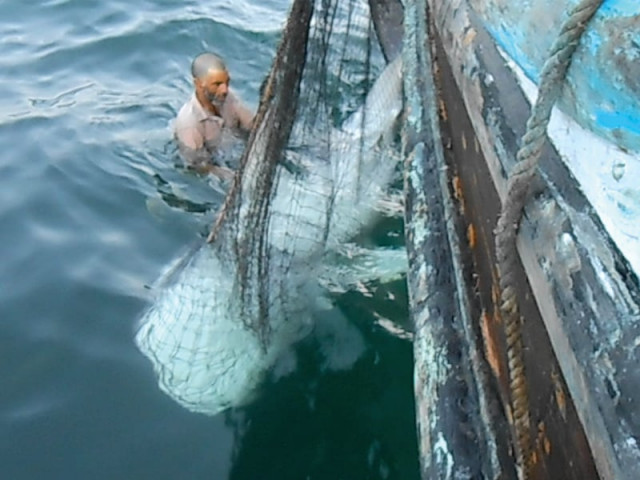Preserving marine life: 12-foot whale shark safely swims off Khobar Creek
Earlier this year, two whale sharks were safely released after fishermen received training.

A juvenile whale shark caught in a tuna gillnet in the offshore waters off Khobar Creek was released without any injury by fishermen on November 20. PHOTO COURTESY: WWF-P
The whale measuring 12 feet in length was entangled in a tuna gillnet in the offshore waters off Khobar Creek about 193km of the south of Karachi. There are no aimed fisheries for whale sharks in Pakistan. Its meat is neither consumed in the country nor exported. However, fishermen extract oil from its liver and use it to smear the hull of fishing boats to keep it smooth. The meat is used to convert into poultry meal. When entangled in a net, the whale shark usually damages the net, causing big losses to the fishermen. Fishermen would, therefore, kill these giants in order to protect their nets.
The World Wide Fund-Pakistan (WWF-P) had initiated a campaign to create awareness and train fishermen about the procedure to safely release entrapped sharks. Through these efforts, a whale shark measuring 3.5 metres was released on May 14 near Sapat, Balochistan, and another measuring three metres was released near Khobar Creek, Sindh coast, on September 24 this year.
Former director-general of the Marine Fisheries Department and WWF-P technical adviser Muhammad Moazzam Khan pointed out the coast of Pakistan is considered to be an important breeding and basking ground for whale sharks. “Neonates, juveniles and sub-adults are commonly found in the area,” he added.
According to officials of the WWF-P, the present specimen was a juvenile having a length of about 12 feet or four metres.
Shah Zamin Khan Nakhuda, owner of the fishing vessel alGul Muhammad, struggled for an hour to safely release the whale shark. During the operation, a part of his fishing net was also damaged.
“The fishermen should be compensated,” suggested Nakhuda. He said that there was no law in Pakistan to encourage fishermen to protect such species. “We are trying hard to pursue the government to bring such a law and hope the suggestion will be considered seriously.”
Whale sharks and its products are included in the Convention on International Trade in Endangered Species of Wild Fauna and Flora (Cites), which puts its export under strict regulatory control. Pakistan is a signatory of Cites, hence, whale sharks are not exported from Pakistan, however, several of them died here after they were caught in the nets.
WWF-P director Rab Nawaz pointed out the gillnet fishing boats of Pakistan are known for high mortality rate of protected, endangered and threatened species, such as whale sharks, turtles and dolphins. He stressed the need for the government to devise a policy to reduce gillnet fishing boats in the country.
He said many countries, including Sri Lanka, has converted a large number of gillnet boats to long-lining which is considered to be a comparatively safer gear against threatened species. “On one side, tuna gillnets result in the reduction of by-catch of these important species and, on the other, it increase fishermen income substantially,” said Nawaz.
Published in The Express Tribune, November 23rd, 2013.



















COMMENTS
Comments are moderated and generally will be posted if they are on-topic and not abusive.
For more information, please see our Comments FAQ